- Home
- Nancy Means Wright
Mad Season Page 2
Mad Season Read online
Page 2
“They had to be local,” Colm said, “or heard from someone local.”
She nodded, watched him wolf down two sugar doughnuts. His face was rounder than when she first knew him, but you could still see the bluish hollows in the cheeks, hunger lines she called them. The family was poor, the grandfather a policeman who got shot on the job. At least the father could count on the mortuary— people kept on dying. He was wise, Colm, nothing pretentious about him. She just hadn’t wanted to marry him, was all. She was looking for the wrong things in a man in those days.
But when Colm asked her now who could have done it, how they’d know about the money, she had no answer.
“Rumors,” she said, spreading her long fingers. “That bar, the Alibi, the fire shed. Gossip gets around. Men can be worse than women.”
She smiled, saying that, and he grinned back, took off his glasses and wiped them on his sleeve. Everyone knew after a family burial you got all the local gossip from Colm’s father.
“I’ll think about it,” she told him. “I’ll talk to the other neighbors. I’ll talk to Pete. I’ll talk to Lucien. They said we could go in tonight to see him. I’ll talk to Belle, when ...”
He looked sympathetic, chewed on his doughnut, his jaw working hard. He chewed everything twenty times, even ice cream. He looked ridiculous doing it, frankly.
“What right did they have,” she said, “breaking into an elderly couple’s home, abusing their persons!” She jammed a fist into the palm of her hand.
The red flushed up into his neck, his cheeks. He liked Lucien too, he got his milk there, his spring corn from Belle’s stand. He’d drop in for a toddy now and then. Colm liked his toddies—too much, maybe.
“I’ll do everything I can to find out who did it,” she said fiercely. “I want them caught. I want them prosecuted.”
He nodded, coughed. “I’m with you.” He pocketed a doughnut as he got up to leave, gave a sly grin. It was good to have an old friend, she thought. She felt safer somehow, no one would violate her house. Would they? She felt a stiffness in her neck.
“They think it was set, no problem with the electrical,” he called back, on his way out. “The Charlebois barn.”
“Oh my God,” she yelled after. “How many bad things can happen in this town?”
But he spread his hands, like he’d just dropped something.
A farm wife was never alone. Now it was Pete’s unmarried sister Bertha barging through the back door, the pink beret that matched her pink lips pulled down over her permed hair, the skirt discreet below her plump knees, the shiny black pumps she wore through snow and mud.
The “disappointed woman,” Ruth called her. Disappointed in love, in school, in career—she’d wanted to be a teacher but couldn’t get into the university. So Bertha stayed home, turned to the church, was an eldress or something.
She didn’t wait for Ruth to speak, just whirled up behind like a motorbike: “You ought to keep your doors locked, Ruth. Anyone could get in.” Not bad advice, Ruth thought, for certain people. “I want you to send Vic down with Pete. Now, don’t wait! For Vic’s sake. Pete’s lonely without the children.”
“Lonely?” said Ruth, her head in the refrigerator. The men would be in for lunch, she had to concentrate on that.
“And Emily. A young girl! Horrible things can happen. The world’s full of sin. All those Hebrews moving in, attracted by the college. I read in the paper . . .”
“We’re all right,” muttered Ruth, her blood rising with her sister-in-law’s prejudice. “I need my children here. I have a farm to run. And I bank my money, what money there is.”
“He sends a check every month, he told me that. Though he doesn’t get that much in sales. I told him years ago to get the MBA, but Father had him take over the farm. Though he was never cut out. . . Oh, he’ll be back. Mother brought us up in the church. Of course it was just the Congregational. Thanks to the Lord I’ve seen the light. But Pete, well, he’s forty-two, that’s the problem, I read this book—the seven-year “scratch” or something? He can’t help himself, he’ll come ‘round.”
She made a little face, straightened her frilly shoulders. The fingers, yellowy with nicotine, though she’d quit smoking she said, combed through the frizzy hair.
Ruth didn’t remind her that Pete hadn’t seen the inside of a church since their wedding. As for the “scratch,” well, maybe Bertha had a point. Pete was just forty-two when they saw him in the post office nine months ago and lured him into that film. He had a bit part, a farmer fighting the gas pipeline—some need to show off, maybe. And afterward he took off with that woman, that so-called actress. It was like he’d gone mad, Ruth was struck dumb with it.
“Look up antidotes in that home remedy book of yours,” she told Bertha.
“What?”
“For ‘scratches.’ “
Ruth was relieved to see the hired man Tim coming through the door, turned her back to end the conversation. Bertha blew her nose into a pink handkerchief. She didn’t approve of Tim’s Willy, one never knew what a retarded boy would do. There was the time she’d had a boy from the group home to Thanksgiving dinner, and he’d swept the turkey right off the table, lickety split, down the street! When she told Ruth, when Ruth giggled, Bertha wept with fury.
“You hear about that fire up to Charlebois’?” Bertha said as she prepared to leave, not waiting for an answer. “The whole barn, gone, in a flash!” Her eyes gleamed red.
“They still won’t let you in the fire department?” Ruth remembered how Bertha had tried once, years ago it was. Ruth rather admired Bertha for wanting to get into that patriarchal fraternity, odd as it seemed in the face of the woman’s antifeminism. She got to some of the fires, anyway—something to do with her belief in hell, Pete said once. But he tolerated his sister the way Ruth couldn’t.
“They would if I’d really pushed it. They’d’ve let me.” And patting her permed hair, Bertha trotted off in her black pumps.
Tim had the state forester with him, come to advise on the trees. Of course the forester would stay to lunch—Tim looked sympathetic, but what could he do? She nodded, took a deep breath. A farmer’s wife was always changing gears, moods: think of the world’s wrongs and then smile, give out with the small talk. Trees, the weather—”We’ll discuss it at lunch,” Pete would say, while he invited tractor salesmen, artificial inseminators, town auditors, to “discuss it over lunch.” Her lunch.
And here they were, talking fertilizers and tree blights like it was an ordinary day and not the aftermath of a brutal assault.
“More soup?” she invited. But it was Willy who held out his bowl.
“He’s hungry,” Tim said. “He had a night on the town, hey, Willy? Worked up a thirst?”
“Girlfriend?” the forester said, winking at Tim.
“Nah, nah, no girlfriend,” Willy bawled, “no girlfriend. Girls are dumb,” and the men laughed again.
“He was down at the Alibi,” Tim explained, “with his friend Joey, one who lives at the group home. Till they got kicked out. Right, Willy? You made too much noise, got kicked out?”
“Sure,” Willy said, enjoying the attention. “Too much noise. Got kick out.”
He drained the chicken soup with a slurping noise, jammed a hunk of buttered bread in his mouth. “Got kick out.” He laughed loudly, and so did the two men.
Ruth served the Jell-0 and cookies, and Tim said, “Not having any yourself?” She shook her head. Food didn’t tempt her today: her mind was a grinding machine. Someone would have to milk the Larocque animals tonight; the daughter and her husband weren’t much help—Marie too flighty and Harold an out-of-work accountant who trembled in the presence of cows. How they’d managed that farm alone, the Larocques, no pipeline or milking parlor, all the time discing with that one rickety tractor! It was a miracle, really, they’d hung onto it when so many had sold—herd buyout or developers—or just shot themselves like the Mason brothers down in Rutland. And now when they should be slowi
ng up, enjoying the fruits of their years of labor . . .
“It’s not fair!” she cried. “It’s not fair!”
And Willy, bringing in plates to the kitchen, glancing at her out of his wide gray eyes, intimidated by her mood, said, “I help clean up. Tim says so.”
She waved him off, put on a smile. “You go help the others.”
But the boy hung around, wanting to talk, his big fuzzy head waggling. She called him a boy though he’d turned twenty-one, with a body bigger and clumsier than he knew what to do with. Couldn’t swim, turn a somersault. Poor Willy! He’d lived in nineteen foster homes, almost one for each year of his life.
“I was plantin’ trees,” he said. “Tim say I find my, my ‘calling.’ “ It was a funny word. He smiled, showing his bad teeth. “What’s that mean, ‘calling’? Who’s calling? Yoo-hoo.” He cupped his hands about his mouth. “Who-ooo.”
“It means you’ve found what you’re good at. Like someone called you to it. Up there, so they say.” She pointed at the ceiling and his eyes followed obediently.
“Though some of us never get called,” Ruth said, bemused.
“It’s okay. Tim, he say his muscles turn to Jell-0, but I like it. I like it with the whip cream.”
“Well, here now. Finish the bowl.” She dabbed a scoop of cream on it. “You want another chocolate cookie, do you?”
* * * *
After the afternoon milking, Ruth went to the hospital. They wouldn’t let her see Belle, only relatives, and the daughter, Marie, was with her. Belle was still in a coma. The nurse couldn’t tell her any more, nor the son-in-law Harold, who stood in the lobby turning and turning his red checkered cap in his hands. Drops of sweat shone on his brow. He could tell her only that the police had come and were sent away.
“A bad business,” he said in his high-pitched voice. “I never imagined something like this. It shouldn’t’ve happened.” Ruth nodded and went on down to Lucien’s room.
“Help me,” an old woman squealed. “Help me!”
“I’m sorry. Ruth brushed past the wheelchair, feeling guilty; there was a dampness in her underarms, in the creases of her neck.
She met Colm Hanna in the doorway of Lucien’s room. He was dressed in an open-necked blue shirt, olive corduroys—nothing matched, nothing hung right on that thin body. He was holding a blue cotton cap in his hand. Colm was crazy about hats, it was rumored he had a hundred in his closet.
“There’s a concussion, multiple lacerations,” he said. “He’s still confused. So I didn’t stay. But I found out one thing: they called him by name. Whoever it was, called ‘Lucien,’ like they knew him.”
He’d seen Belle’s daughter and her husband when he came in. Marie was distraught about her parents but couldn’t shed any light. The husband, Harold, had little to add—as inarticulate a man as he’d known. “Marie mentioned your boy, Willy. In a funny way, you know, like he might be—”
“Implying what? That Willy’s involved?” The blood swelled in her cheeks. “That’s absurd. We all know that!”
“Hey, I’m just reporting. We have to think of everyone. Anyone who knew Lucien well, his habits. Your man Tim as well?”
Her dander was up now. “He’s a good man, Tim! He never takes a nickel from Lucien, just helps out in his spare time. He’s there now.” She felt her neck stiffen.
“He might have seen something, Ruth, that’s all.” He held up his arms in truce.
“Oh, yes, yes, okay, I suppose you’re right.”
“Maybe I could drop over in the morning, we could both talk to them. Kids’ll be in school, I suppose.”
“They wouldn’t suspect my children!” She took a step back into the corridor, knocked into a door, rubbed her shoulder.
“They might have seen something. You said Emily came in late, with the boyfriend. Who knows? Hey!” He dropped his hands at his sides, like the criminal mind was beyond his ken.
“They get home around four. But Vic, he’s only in fifth grade. I don’t want him upset. He’s had troubles enough in school.”
“Troubles?”
“He and a couple of other kids. Because they’re farm kids, they smell of the farm. They call him . .. look, Colm, I came to see Lucien. I have to get home to get Vic in bed, help Emily with her paper. I studied history, remember? Before I turned into a farm wife?”
He looked serious. He’d wanted to marry her, she kept forgetting that. He couldn’t seem to forget, though. The way he looked at her sometimes, like the sun hanging over Bread Loaf Mountain, not wanting to go down.
He waved his cap at her, smiling now, stuck it on his head at a jaunty angle. He was really quite attractive, with his cheeks filled out. She watched him go down the hall. He sort of bowled along, like his legs wanted to go in a different direction from his body, but shoulders back. You wondered if he’d make the door all right.
He turned to doff the hat again. And whoa! He was walking into a supply closet. He looked back, grinned at his error.
She was smiling herself when she went in to see Lucien.
The man was too confused to identify the assailants in any way, and she dropped the subject. It was shock enough to see him:
bruises, odd swellings, the broken nose she hadn’t seen when she picked him up that first time. But then she’d been in shock to find him like that: he’d looked so small in that ditch, like a shrunken potato, and behind him, his meadows swelling up to the foot of the Green Mountains. In the hospital bed now he seemed larger, or maybe it was the bandages that bound his limbs, his forehead.
“Belle?” He reached out his arms.
“Belle’s here, Lucien. In another room. She’s going to be all right.” The wet oozed up under her arms as she spoke. “How are you? Pretty early to be going to bed, isn’t it?” She looked at her watch. “Seven-eighteen?”
He didn’t smile. He couldn’t, of course, there was a nasty cut at the corner of his mouth, red pit marks on his cheek like a machine of some kind had stamped it; some teeth seemed to be missing. He didn’t take care of his teeth, Belle said, didn’t want to spend the money. “You want them all pulled out, do you?” she’d say. “You want to spend a thousand dollars on false ones?” Ruth had heard the complaint more than once.
“Look in my pocket there.” He tried to get up on an elbow but fell back down on the pillow.
“Closet,” he said, pointing.
She smelled the coat before she saw it. Funny how she could work with the smell of barn all day and yet it was a surprise when she came on it elsewhere. She reached deep in the seams, where the pocket had ripped, pulled out a stubby pencil, a couple of nails, a handkerchief, some crumpled paper, a pouch of Beechwood tobacco.
“No bills?” Panic spread across his face. “Down in the lining?”
“The police would have it,” she lied.
“Police! Mary and Joe, what business they got. Gemme out of this bed. Who’s milking? Belle can’t do it all, she’s getting old, Belle.”
“My hired man’s over there now,” she promised. “The farm’s in good hands.”
“Help me out of this bed,” Lucien repeated. “I can’t spend the night here. Belle, she don’t like to be alone at night. I say not to worry, but she say you never know who. Look, tell her she can lock the door she wants to.”
He fell back again from exhaustion and shut his eyes; the lids were the color of scratched pewter. She sat on the edge of the bed, feeling helpless.
“Belle,” he murmured, opening his eyes a crack, holding out a hand. “Get that Tim over to help with the cows. You can’t do it alone, Belle. You hear me now? I be down in the morning. Belle?” The eyes shut again, the voice was a whisper.
“Belle? You hear me?”
“I hear you,” Ruth whispered back.
* * * *
Emily was on the phone when Ruth got home. Ruth removed her shoes before she entered the kitchen—she hated scrubbing floors. It had begun to rain outside, and though it was good for the sapling trees, the mu
d would put off plowing till May. The old John Deere was problem enough on hard ground. And the barbed wire on the north pasture fence, where she wanted to send the cows, needed mending, the cows would have a heyday. It was one thing after the other!
And now the boyfriend, Wilder, that city boy, on the line, she could tell from her daughter’s voice. Ought to have the decency to leave her alone on a night like this. Though Emily didn’t seem to think so. She was lying back on the sofa, the wire stretched across the room and over the sofa back. Another quarter inch, it would strangle the iron lamp. They talked this way every night: anyone else who called in would get a busy signal. It didn’t bother his parents, of course. Wilder and the older Unsworth boy had their own phones, Emily said. Nice to have that kind of money, Ruth thought.
She nodded meaningfully at Emily as she passed. “Mom’s home,” she heard Emily tell Wilder. “I’ve got to do my history paper. I was helping next door—the Larocques got hurt, you hear that? I didn’t know till I got home from school. Somebody in the middle of the night. Must have been after you left. Huh? Yeah, they were hurt bad. Mrs. Larocque’s in intensive. Wilder? You there? She’ll be okay—we hope so! Wilder, there’s still a full moon. Remember? I saw you there in the car, watching. I saw you from my window. You were still there when I pulled the shade. I was with you.” Emily’s voice was almost a whisper, but Ruth could hear. She’d had keen ears since the births of her children. “I mean, I spoke to you, from my room. Didja hear me? Yeah. Well then, see you in class. I miss you. You get there tomorrow, hear?”
She made a kissing sound into the receiver, and Ruth winced where she stood on the top step.
“Wilder wasn’t in school today?” she asked when Emily came upstairs.
“He was starting a cold,” Emily said.
“That was a reason to miss school?”

 Stolen Honey
Stolen Honey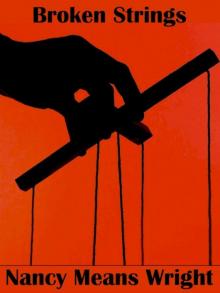 Broken Strings
Broken Strings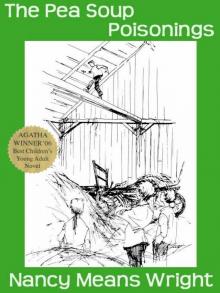 The Pea Soup Poisonings
The Pea Soup Poisonings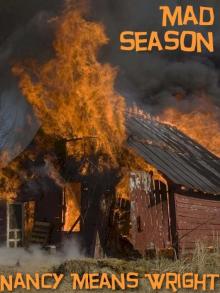 Mad Season
Mad Season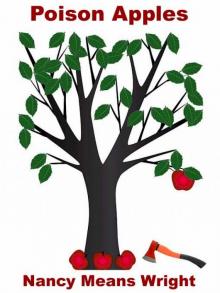 Poison Apples
Poison Apples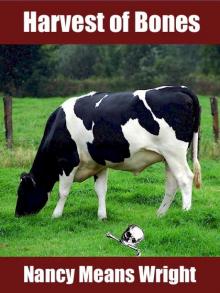 Harvest of Bones
Harvest of Bones